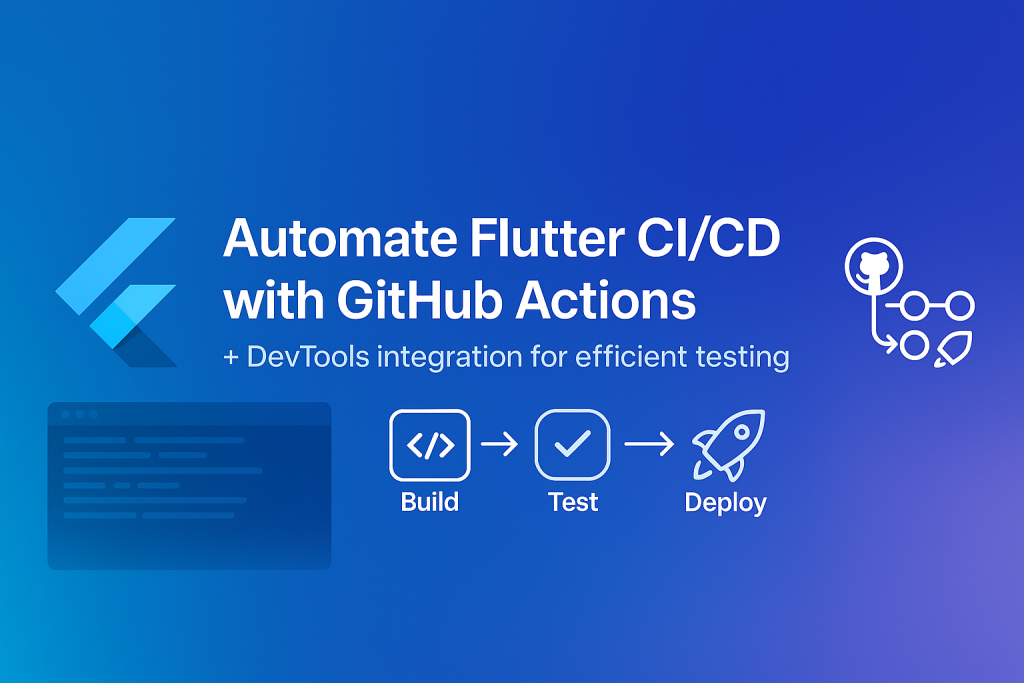
Introduction
In modern app development, speed, quality, and reliability matter more than ever. For Flutter—where apps run across Android, iOS, web, and desktop—manual build and test processes can become slow and error-prone.
This is where Continuous Integration (CI) and Continuous Delivery (CD) come in. By automating builds, running tests, and deploying from a shared pipeline, teams can move faster without sacrificing quality.
In this guide, we’ll set up a production-ready Flutter CI/CD pipeline using GitHub Actions and Flutter DevTools for testing insights.
Why Automate Your Flutter Workflow?
- Before diving into the “how,” let’s briefly touch upon the “why.” Automating your Flutter development process with CI/CD brings a multitude of benefits:
- Faster Release Cycles: Automated builds and deployments significantly reduce the time it takes to get your app into the hands of testers or users.
- Improved Code Quality: Running automated tests (unit, widget, and integration) on every code push helps catch bugs early, ensuring a more stable and reliable application.
- Consistency and Reproducibility: CI/CD pipelines ensure that every build follows the same set of steps, eliminating human error and guaranteeing consistent results across environments.
- Enhanced Collaboration: Teams can work more efficiently, with immediate feedback on code changes and readily available builds for testing.
- Reduced Manual Effort: Free up developers from repetitive tasks like manual builds, testing, and deployments, allowing them to focus on core development.
Setting Up GitHub Actions for Flutter
1. Project Setup
First, ensure your Flutter project is hosted on GitHub. If not, create a new repository and push your existing project.
2.Create Workflow File
In your Flutter project repository, create a .github/workflows directory and add a new YAML file (e.g., flutter-ci.yml):
name: Flutter CI
on:
push:
branches: [ main, develop ]
pull_request:
branches: [ main, develop ]
jobs:
build:
runs-on: ubuntu-latest
steps:
- uses: actions/checkout@v2
- uses: subosito/flutter-action@v2
with:
flutter-version: '3.19.0' # Specify your Flutter version
channel: 'stable'
- name: Install dependencies
run: flutter pub get
- name: Analyze code
run: flutter analyze
- name: Run tests
run: flutter test
- name: Build APK
run: flutter build apk --release3. Customizing Your Workflow
Add additional steps based on your needs:
# Add these under the steps section
- name: Format check
run: flutter format --set-exit-if-changed .
- name: Build iOS (simulator)
if: runner.os == 'macos'
run: flutter build ios --simulator --release
- name: Upload APK artifact
uses: actions/upload-artifact@v2
with:
name: release-apk
path: build/app/outputs/flutter-apk/app-release.apkIntegrating Flutter DevTools
Flutter DevTools provides powerful debugging and performance analysis tools that can be integrated into your CI pipeline:
1. Code Coverage Reporting
- name: Generate code coverage
run: flutter test --coverage
- name: Upload coverage to Codecov
uses: codecov/codecov-action@v1
with:
file: ./coverage/lcov.info2. Performance Testing
- name: Run performance tests
run: flutter drive --target=test_driver/app.dart3. Size Analysis
- name: Analyze app size
run: flutter pub run devtools --app-size-base=apkAdvanced CI/CD Features
1. Environment-Specific Builds
- name: Build for staging
if: github.ref == 'refs/heads/develop'
run: flutter build apk --release --flavor staging
- name: Build for production
if: github.ref == 'refs/heads/main'
run: flutter build apk --release --flavor production2. Firebase App Distribution
- name: Distribute to Firebase
uses: wzieba/Firebase-Distribution-Github-Action@v1
with:
appId: ${{ secrets.FIREBASE_APP_ID }}
token: ${{ secrets.FIREBASE_TOKEN }}
groups: testers
file: build/app/outputs/flutter-apk/app-release.apk3. App Store Connect Deployment
- name: Deploy to TestFlight
if: github.ref == 'refs/heads/main'
uses: apple-actions/upload-testflight-build@v1
with:
app-path: build/ios/ipa/app.ipa
apple-id: ${{ secrets.APPLE_ID }}
apple-id-password: ${{ secrets.APPLE_PASSWORD }}
app-specific-password: ${{ secrets.APP_SPECIFIC_PASSWORD }}Best Practices
- Cache dependencies to speed up builds:
- uses: actions/cache@v2
with:
path: |
~/.pub-cache
build/
key: ${{ runner.os }}-pub-${{ hashFiles('**/pubspec.lock') }}- Matrix testing across different OS and Flutter versions:
yaml
strategy:
matrix:
os: [ubuntu-latest, macos-latest]
flutter: ['3.19.0', '3.19.1']- Set up branch protection rules in GitHub to require CI passes before merging.
- Monitor build times and optimize slow steps.
- Use secrets for sensitive data like API keys and certificates.
Troubleshooting Common Issues
- Dependency conflicts: Run flutter pub upgrade locally and update pubspec.lock
- Build failures: Check the exact Flutter version used in CI matches your local version
- Test flakes: Investigate intermittent test failures and fix or mark as skip
- Performance issues: Optimize your workflow with caching and parallel jobs
Conclusion
By implementing GitHub Actions for your Flutter CI/CD pipeline and integrating Flutter DevTools for testing and analysis, you can significantly improve your development workflow. This setup ensures that every code change is automatically tested, analyzed, and ready for deployment, while maintaining high code quality standards.
Start with a basic workflow and gradually add more advanced features as your project grows. The investment in automation pays off quickly through reduced manual work and more reliable releases.

